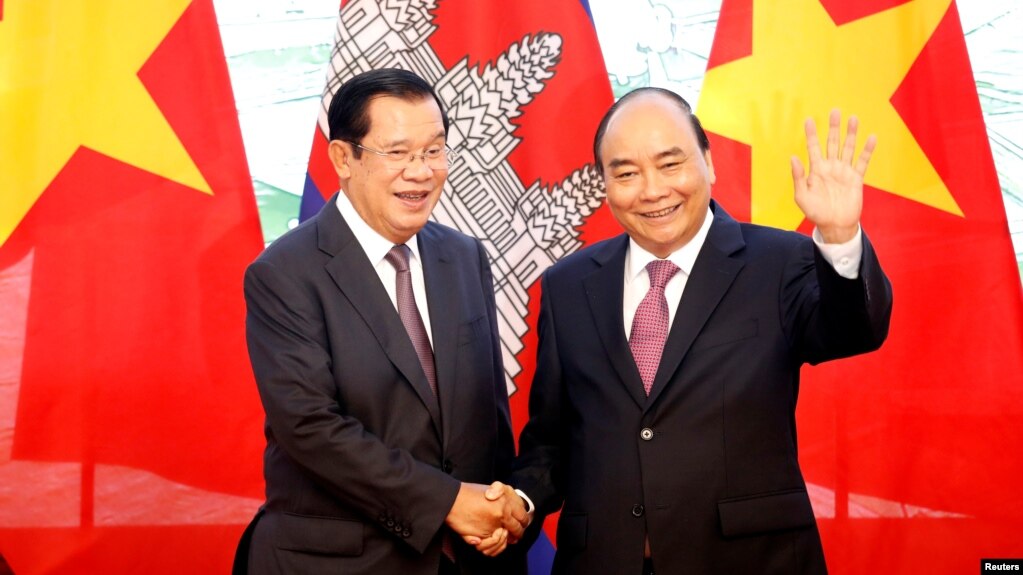Khmer Circle:
Well, to begin with, aren't the two words, "Vietnamese" and "interference", one and the same? In fact, could the Vietnamese state survive and continue to prosper [expand] at immeasurable pain and expense to its neighbours were it to cease interfering in the latter's affairs?!
^^^
09 December 2019
Aun Chhengpor
VOA Khmer

In this photo taken on Oct. 4, 2019, Cambodia's Prime Minister Hun Sen poses for a photo with his Vietnamese counterpart Nguyen Xuan Phuc at the Government Office in Hanoi, Vietnam.
PHNOM PENH —
Vietnam has raised concerns about “interference” and “division” in its bilateral ties with Cambodia in the recently released “Defense White Paper 2019”, with observers saying it was likely referring to Phnom Penh’s growing proximity to Beijing.
Vietnam’s defense ministry released the “Defense White Paper 2019” on November 25, with VOA Khmer obtaining a copy of the document over the weekend. The document provides a rare insight into the strategic thinking within the Vietnamese defense establishment, especially on geopolitical issues, like the South China Sea conflict, and regional ties.
In a section titled “National Defense Struggle”, the paper illustrates efforts to protect “special strategic” ties with Cambodia, and refers to potential challenges to its bilateral ties with Phnom Penh, though this is done using ambiguous language.
“Viet Nam opposes acts of interference and division of the bilateral relationship,” the paper reads, without further elaboration.
The Vietnamese embassy in Phnom Penh, the defence ministry in Hanoi and a spokesperson at Cambodia’s Ministry of Defence could not be reached for comment on Monday.
While the Hun Sen government and Vietnam have ties going back to the liberation of the country from the Khmer Rouge in the late 1970s, especially close military cooperation, Phnom Penh has recently moved closer into Beijing’s orbit, on account of its increased economic investment in the country.
Cambodia’s Foreign Ministry spokesperson Koy Kuong declined to comment on the contents of the defence document on Monday, saying he had not read it.
But, he added it would be “completely wrong” to infer that Cambodia’s relations with China would hurt its ties with Vietnam.
“I think both [China and Vietnam] are important and we have never regarded one as more important than the other, as such they are equally crucial,” Koy Kuong told VOA Khmer by phone.
Chheang Vannarith, president of the Phnom Penh-based think-tank Asian Vision Institute, said Vietnam was likely referring to China.
“Vietnam wants Cambodia to be independent from any third country trying to meddle or sabotage the bilateral traditional relations,” Chheang Vannarith said. “It is a strong message said out loud publicly.”
The paper goes on to describe Hanoi’s commitments to execute agreements signed with Phnom Penh over the contentious issues of land borders, including a memorandum of understanding on “land borders adjustment” in the remaining un-demarcated areas.
“Viet Nam and Cambodia continue to negotiate for the resolution of issues with regard to land and maritime boundaries in the spirit of friendship, cooperation, and strict compliance with commitments and in conformity with international law and practices,” the document reads.
Border demarcations with Vietnam has been a sensitive topic in Cambodia, with critiques, including the Cambodia National Rescue Party, alleging that border post adjustments would be a “loss” of land for Cambodia, a view widely held among Cambodian voters.
Koy Pisey, deputy chief of the permanent secretariat of the Cambodia’s National Authority for Border Affairs, rejected any such notion, and said that border demarcation would not be a “loss” for Cambodia.
She said both countries were working to fairly resolve the issue, using accurate calculations of where the actual border posts should be located.
“Like I have said, when the exchanges take place, it would go like this: if a hectare [of land] is lost, another hectare must be gained.”
“We must be certain that there is no gain and no loss,” Koy Pisey told VOA Khmer by phone.
Loek Sothea, a spokesperson for the opposition Grassroots Democratic Party, said the government needs to build public trust in its handling of the border demarcation process.
“What we want to know is whether the adjustments are taking place transparently and equally,” Loek Sothea said.

No comments:
Post a Comment